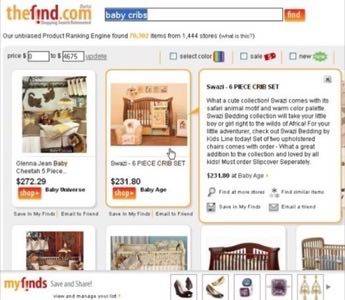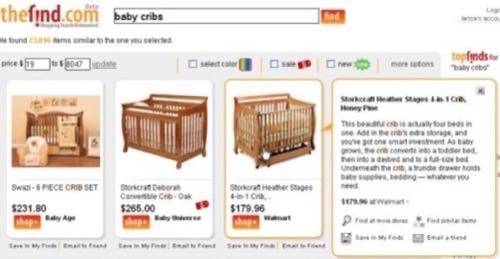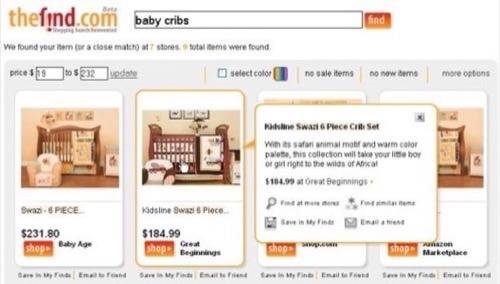Recently I spoke with Siva Kumar, founder and CEO of TheFind.com – a next generation online shopping engine focused on the Lifestyle segment. According to Siva, TheFind.com is a discovery shopping search engine optimized for lifestyle products such as clothing & accessories, home & garden, sports & outdoor, kids & family, and health & beauty.
What is TheFind?
TheFind comprehensively indexes all of the products available for sale from all online retail sites, then – using derived knowledge of the shopping domain – serves up just the right matching products, ranked in order of best selling brands, styles and stores. In this piece, I will review their offering against my Web 3.0 framework.

The results display is very visual, with large pictures of the products. It resembles a customized shopping catalog that has been constructed for a specific consumer search query. Additional search tools provide a way for consumers to search for items similar to the one that interests them, and also to find all of the stores that carry a particular product – in order to decide the best place to buy the desired product.
See for yourself – this is a very different internet shopping experience than the largely text based results offered by Google, Shopping.com, etc.
[Ed: TheFind.com is consistently in Charles Knight‘s Top 100 Alternative Search Engines list; he often uses them as an example of how the alts are so much better than Google – in this case Froogle – in their chosen niche.]
It’s one of the best visual merchandising oriented search engines I have seen on the web, which is a key differentiator for the Lifestyle segment. Its competitors include Like.com, the reinvented version of the photo search engine company Riya; and ShopStyle, a fashion search engine.
Examples
Below is an example search for “Baby cribs”, Baby cribs “like this one”, and Baby cribs like this one “in other stores”. I don’t know of any other shopping search engine that offers this kind of a visual search experience with such comprehensive coverage. However note that to complete the transaction, I would need to go to the store, so Commerce is not included in the user experience value proposition.
As Siva calls it, this looks like a cross between Google and Bloomingdale’s catalogue!
search for “Baby cribs”

Baby cribs “like this one”

Baby cribs like this one “in other stores”

TheFind in Fashion Vertical
Now, let me switch the Context to Fashion, which is a somewhat more complex category. What I would like to see added onto TheFind experience are:
- Personalization: If I am looking for an Armani jacket instead of a baby crib, then I have issues around Mens or Womens, Size, Color. I could not only be shopping for myself, I could also be shopping for my husband, or my kids. Color is addressed nicely, but the rest of the complexities are not yet fine-tuned.
- Content: I might want to read product reviews from Vogue or Harpers on the products I am viewing. As it stands, this kind of granular matching is not possible.
- Community: I might want to leverage the knowledge of the community into my shopping experience, pointing to technologies such as Collaborative Filtering, which Amazon has so successfully built into their shopping experience – offering “those who looked at X also looked at Y”.
Conclusion
Against my Web 3.0 framework, TheFind does a very nice job – especially in the Vertical Search front (A+) and a reasonable job with Context (A-). It would win a lot of points by working in Personalization, and Content and Community – even if Commerce is left to the stores. To do that, however, the technology challenge is significant. They have to add a complete new vector: the notion of capturing and characterizing the Customer Profile, along with and track and store customer behavior, in a fairly comprehensive way.
Given all the Stanford Computer Scientists in the company, this shouldn’t be impossible!
This post was written by Silicon Valley Entrepreneur and Strategy Consultant Sramana Mitra. On her blog Sramana Mitra on Strategy, she writes about entrepreneurship, venture capital, emerging markets, strategy, policy, leadership and sundry other business topics. Sramana Mitra has been the founder CEO of 3 startups, Interim VP of Marketing of 7 startups, and has consulted for over 70 companies including public companies such as SAP, Cadence, Webex, and others.

















